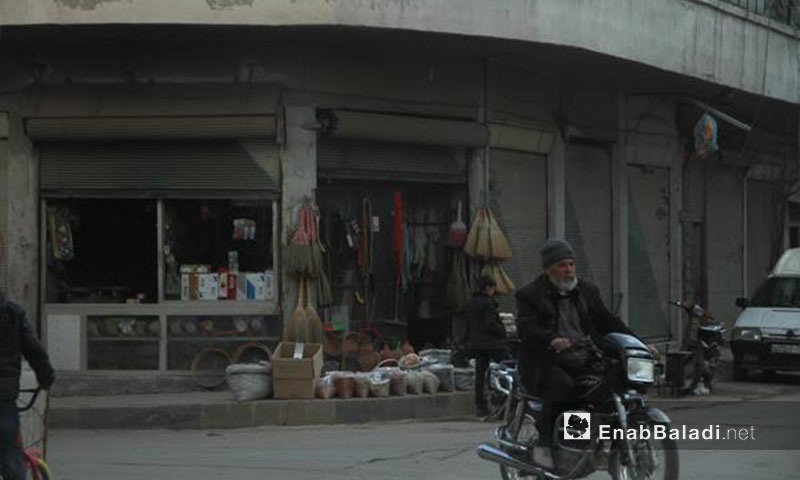



Ghayath Haj Hussein owns a grocery shop in the city of Idlib. There he sells four kinds of medicines, as he told Enab Baladi, noting that they are ‘painkillers and anti-inflammatory pills of two concentrations.’
“I display them in my shop to serve the people of the area,” said Ghayath, as a justification for selling the medicines. “The way they are used is known to everyone, and I don’t think that by selling them, I would be assaulting pharmacist and doctors. People prefer to find everything in the neighborhood’s grocery shop.”
The owner of the grocery shop asserts that he doesn’t sell all types of medicines for it is not an easy thing to do.
Pharmacists and doctors cannot be dispensed with, the seller says. “There are diseases whose medicines cannot be given except to those who need them.”
Mohammed Dakhlallah, a student at the Faculty of Sharia at Idlib University, considered that the matter “cannot be tolerated.”
He says that “every party that claims itself as responsible for the city,” should be held accountable “for the consequences of selling drugs in this random manner.”
“We cannot know the sources of medicines sold in shops,” said Mohammed. “It’s not as simple as some people think. It’s dangerous and needs to be addressed.”
Once again appears the phenomenon of selling medicines in grocery shops. In the city of Idlib and some parts of the governorate’s countryside, the phenomenon prevails without restrictions. Specialists refuse the situation while some of the shop owners, who are selling medicines, justify it by saying that it is to serve people.
Enab Baladi conducted a survey in Idlib on the issue, including specialists and owners of shops selling medicines, in addition to some parents: their views are conflicting in this regard.
Manar Halaq, a graduate of the Faculty of Pharmacy, who owns a pharmacy in Idlib, says that the “bad” phenomenon of selling medicines in grocery shops cannot be tolerated. “How can an unqualified person prescribe the right medicine without knowledge?”
“Everyone is his or her own doctor,” added Manar, speaking about the phenomenon’s harm. “Medicine is not a box of biscuits which everyone can have without any problem.”
“[Selling medicines in grocery shops] might lead to a real tragedy if an error occurs, each medicine has its own conditions; otherwise, there would be no need for a doctor or pharmacist.”
Dr. Abdo Hassan al-Najjar, a specialist in internal diseases and children at Maarrat al-Nu’man Hospital in rural Idlib, said that it is possible to sell painkillers and anti-inflammatory drugs. “This is not absolutely dangerous, as it only harms very rare cases.”
“The real danger lies in the abuse of medicine or pharmacy by the public, especially Arabic medicine and herbs,” says the specialist. “I have not seen sales of quality drugs at the moment. However, the phenomenon must certainly be fought.”
In order to find out the role of the Health Directorate of Idlib in containing the phenomenon, Enab Baladi made an interview with the Minister of Health in the Syrian Interim Government, Dr. Firas al-Jundi, who said that the phenomenon, which has been prevalent even prior to the revolution, is now limited and under control.
The minister said that, now, the important thing to do is to license pharmacies according to the regulations of the law. “Many pharmacies are unlicensed until today, and persecuting them is more important than the phenomenon of the grocery shops which are selling Setamol and anti-inflammatory drugs on a limited scale.”
According to al-Jundi, the ministry is working on the issue of the lack of licensing and trying to make sure of the validity of the pharmacists’ certificates, noting that these procedures also include health directorates deployed in the liberated regions and not only Idlib.
if you think the article contain wrong information or you have additional details Send Correction